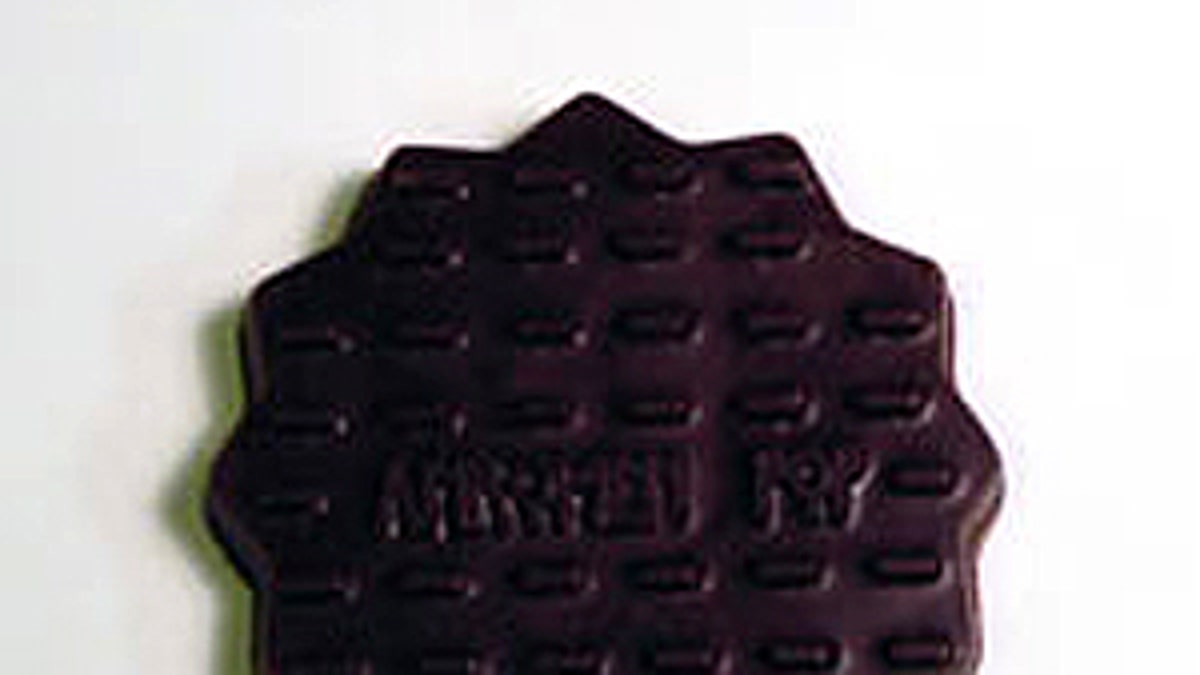
If you’re out to please the family, nothing says “Happy Passover” like the Chocolate Ten Plagues. Really.
“The Seder (the Passover meal) is a kid-centric activity where Jewish children learn about their history. What better way to talk about the plagues than with chocolate,” ask David and Melissa Levine, owners of Illinois Nut & Candy in Skokie, Illinois, the Midwest’s largest kosher candy store. David remembers having no “fun Passover kid stuff” when he was little. That’s because corn syrup, a universal sweetener and key baking ingredient, isn’t kosher for Passover and neither are leavening agents like yeast, or even peanuts. Hence, nothing fun and sweet for kids. That is, until David and Melissa turned the Plagues into chocolate.
New for 2010, each chocolate square depicts a plague that God, through Moses, rained down on Egypt to force Pharaoh to honor his promise to free the Jews: blood, frogs, lice, wild beasts, death of livestock, boils, hails, locusts, darkness and death of the first born. The Levines commissioned an artist to create something “accurate but not scary” and together they came up a sun with a sun with a circle and slash for darkness, upside down animals for livestock and a red chocolate square for blood. And talk about your childhood wishes, with their chocolate Seder Plate, you can even eat the dishes.
Although it was already the largest kosher candy store in the Midwest when the Levines bought Illinois Nut & Candy in 2004, they noticed a drop in business that first year between Purim (February and March) and Passover. They saw it as an opportunity to create a new market in kid-friendly kosher confections. Chocolate frogs debuted in ’06 (second plague), wild beasts in’07 (fourth plague), chocolate frog lollipops in ’08. For ‘10, Melissa came up with the Ten Plagues.
David and Melissa want to build Illinois Nut & Candy into the Midwest’s biggest niche confectioner stocking gluten free,lactose free, sugar free, casein free, organic and vegan-friendly lines. Niche candies have gotten a bum rap in the past, rightly so says Levine, because many tasted awful. “I have to like it and it has to taste and look a certain way or I won’t sell it,” he says. Their peanut butter bark won the Best New Product Competition in the Dessert, Candy, Cookie and Cracker category at the 2009 Kosherfest. “People don’t just come to us because we’re kosher. They come to us because we have great candy.”
David's positively giddy about sweets and once he starts talking about them he gives the impression that he’s powered by steam: “We sell more than 1000 confections and make our own chocolate - 55% 58% cocoa content in our dark chocolate, if we go higher, it’s too bitter, our customers like sweeter - including fourteen varieties of bark, lots of turtles, crème-filled miniatures, toffees, taffies, peanut brittle, chocolate lollies, rocky road bars, two lines of truffles, a line of “Get Well” and “Thank You” chocolates in seventeen languages and chocolate-dipped glace fruit. We’ve got frogs, beasts, plagues and cashew brittle for Passover. There’s Easter candy and jelly beans, honey-coated nuts, mixed nuts, dried fruits…” And it’s all produced under kosher supervision. Think of it as really good quality control.
“Kosher” refers to Jewish dietary laws which dictate which foods can and can’t be eaten (pork or shellfish aren’t kosher), which foods can’t be combined (meat and dairy) and how food must be prepared. Some think that a rabbinical blessing makes food or ingredients kosher. Nothing is further from the truth, says Levine. What makes food kosher is how it gets to your table. Rabbis supervise butchering and inspect factories and in terms of candy, they ensure there’s no cross-contamination, i.e. that dairy-free candy is not processed on machinery that also process dairy. Rabbis don’t just bless. A blessing is something you do at the table.
Though David came late to candy he says it feels like it was always meant to be. “Some people when they work in this business, take a taste here, there and that’s enough. Not me. I eat it all day long,” he enthuses. Other than always having had a passion for candy and chocolate there was no obvious path from his previous IT career to confections.
David was downsized after the dotcom bust and unemployed for months. He eventually found some municipal work but “the lack of thinking on your feet and outside the box, the bureaucracy, the inability to implement solutions” frustrated him. The only solution was to own a business. “They always say find something you love,” he says. He heard that Illinois Nut & Candy was for sale; Melissa had actually worked there as a teen. They didn’t think twice.
“I can’t play with the big boys and pay what they can but I’m flexible if someone has a family issue,” he says. “Small businesses can do that.” But mostly he’s all about customer service. “Every kid who comes in gets a sucker. Kids come in with 50 cents each and I made sure they each leave with something.” A couple came in to pick out blue, white and black candies to match their wedding, and they weren’t Jewish. The picked out blue and white taffy, blue and white Jordan almonds, blue and white Sno Caps, white chocolate pretzels, and filled fifteen jars.
